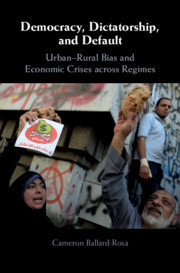
- Cited by 6
-
Cited byCrossref Citations
This Book has been cited by the following publications. This list is generated based on data provided by Crossref.
Gill, David James 2021. Rethinking sovereign default. Review of International Political Economy, Vol. 28, Issue. 6, p. 1751.
Ballard-Rosa, Cameron Mosley, Layna and Wellhausen, Rachel L. 2022. Coming to Terms: The Politics of Sovereign Bond Denomination. International Organization, Vol. 76, Issue. 1, p. 32.
Mosley, Layna and Rosendorff, B Peter 2023. Government Choices of Debt Instruments. International Studies Quarterly, Vol. 67, Issue. 2,
Hansen, Daniel 2023. The democratic (dis)advantage: The conditional impact of democracy on credit risk and sovereign default. Economics & Politics, Vol. 35, Issue. 1, p. 356.
Ballard-Rosa, Cameron Carnegie, Allison and Schonfeld, Bryan 2023. The Geography of Democratic Discontent. British Journal of Political Science, Vol. 53, Issue. 2, p. 366.
Brown, Kathleen J. DiGiuseppe, Matthew and Shea, Patrick E. 2024. Ethnic politics and sovereign credit risk. Review of International Political Economy, Vol. 31, Issue. 2, p. 589.
- Publisher:
- Cambridge University Press
- Online publication date:
- July 2020
- Print publication year:
- 2020
- Online ISBN:
- 9781108871310




